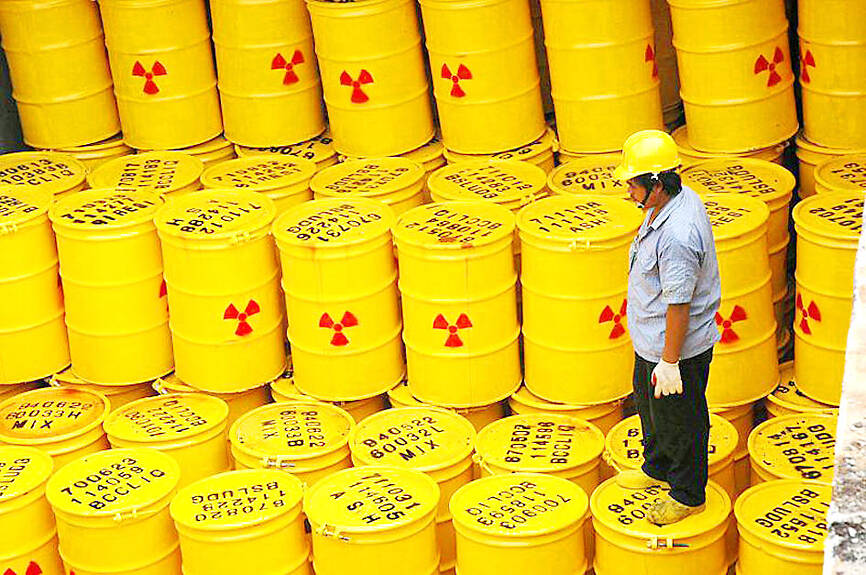Environmental groups at a news conference this month proposed a draft bill to regulate how sites are to be selected to store high-level radioactive waste and called on lawmakers to act swiftly on the issue.
Green Citizens’ Action Alliance secretary-general Tsui Shu-hsin (崔愫欣) said that storage facilities holding nuclear waste at nuclear power plants are full and dry cask storage has a service life of only 40 years.
There is no long-term solution for high-level radioactive waste, creating an urgent threat that requires prompt legislation, Tsui said.

Photo: CNA
Taiwan, which as recently as in the first half of the 2010s generated 15 to 20 percent of its electricity from nuclear facilities, has phased out nuclear power. It now generates about 85 percent of its electricity from fossil fuels.
Previous attempts to designate a permanent disposal site for high-level nuclear waste have met strong public resistance.
In 2012, state-run Taiwan Power Co (Taipower) conducted a drilling operation in Hualien County’s Sioulin Township (秀林), sparking speculation that it was scouting for a site to dispose of high-level nuclear waste.
Taipower said the drilling was part of general geological research.
Similar drilling activity was reported in Kinmen County in 2013, again without prior public notice.
The operations sparked fierce backlash over the company’s apparent lack of transparency.
A 2022 Control Yuan report found that no progress had been made in identifying a suitable site.
Chang Yu-yin (張譽尹), an executive director of the Environmental Jurists Association, said that the bill’s comprehensive procedures would encourage public participation and make selection of a site more likely.
The proposal outlines four components of the disposal site selection process, from policymaking and potential candidate sites to candidate and approved sites, Chang said.
It ensures open information and civil participation throughout the process, and prioritizes volunteered locations that would receive compensation of up to NT$10 billion (US$339.44 million), he said.
It also introduces a meeting platform for two-way learning and communication to obtain informed consent from residents of selected sites, he said.
The Ministry of Economic Affairs would be in charge of the legislation, while the Nuclear Safety Commission would be the regulatory authority, Chang said.
An incorporated administrative “radioactive waste management center” would be established as the enforcement authority to ensure separation of powers, he added.
Several groups spent more than three years meeting with academics and others, and consulting the Energy Administration and Taipower to prepare the draft bill, the Environmental Jurists Association wrote on Facebook on July 8.
Taiwan Obasang Political Equality Party Secretary-General Ho Yu-jung (何語蓉) also called for speedy action on legislation.
The proposed rules would regulate the site selection process comprehensively, protect local participation and oversee government responsibilities and monitoring mechanisms, Ho told the news conference.
Green Party Taiwan coconvener Kan Chung-wei (甘崇緯) urged the legislature to review the draft bill and allow reasonable democratic procedures to replace political manipulation.
The ministry in April set up a project management office for radioactive waste management tasked with proposing a draft act on selecting final sites for high-level radioactive waste disposal facilities, as well as platforms to communicate witht he public on the issue.
The ministry’s draft bill is scheduled to be reviewed by the Cabinet at the end of the year.

Foreign travelers entering Taiwan on a short layover via Taiwan Taoyuan International Airport are receiving NT$600 gift vouchers from yesterday, the Tourism Administration said, adding that it hopes the incentive would boost tourism consumption at the airport. The program, which allows travelers holding non-Taiwan passports who enter the country during a layover of up to 24 hours to claim a voucher, aims to promote attractions at the airport, the agency said in a statement on Friday. To participate, travelers must sign up on the campaign Web site, the agency said. They can then present their passport and boarding pass for their connecting international

Temperatures in northern Taiwan are forecast to reach as high as 30°C today, as an ongoing northeasterly seasonal wind system weakens, the Central Weather Administration (CWA) said. CWA forecaster Tseng Chao-cheng (曾昭誠) said yesterday that with the seasonal wind system weakening, warmer easterly winds would boost the temperature today. Daytime temperatures in northern Taiwan and Yilan County are expected to range from 28°C to 30°C today, up about 3°C from yesterday, Tseng said. According to the CWA, temperature highs in central and southern Taiwan could stay stable. However, the weather is expected to turn cooler starting tonight as the northeasterly wind system strengthens again

COOLING OFF: Temperatures are expected to fall to lows of about 20°C on Sunday and possibly 18°C to 19°C next week, following a wave of northeasterly winds on Friday The Central Weather Administration (CWA) on Sunday forecast more rain and cooler temperatures for northern Taiwan this week, with the mercury dropping to lows of 18°C, as another wave of northeasterly winds sweeps across the country. The current northeasterly winds would continue to affect Taiwan through today, with precipitation peaking today, bringing increased rainfall to windward areas, CWA forecaster Liu Pei-teng (劉沛滕) said. The weather system would weaken slightly tomorrow before another, stronger wave arrives on Friday, lasting into next week, Liu said. From yesterday to today, northern Taiwan can expect cool, wet weather, with lows of 22°C to 23°C in most areas,

Taiwan sweltered through its hottest October on record, the Central Weather Administration (CWA) said yesterday, the latest in a string of global temperature records. The main island endured its highest average temperature since 1950, CWA forecaster Liu Pei-teng said. Temperatures the world over have soared in recent years as human-induced climate change contributes to ever more erratic weather patterns. Taiwan’s average temperature was 27.381°C as of Thursday, Liu said. Liu said the average could slip 0.1°C by the end of yesterday, but it would still be higher than the previous record of 27.009°C in 2016. "The temperature only started lowering around Oct. 18 or 19